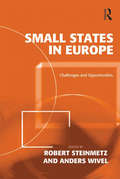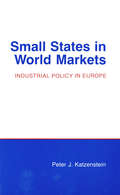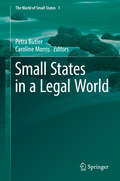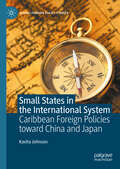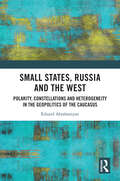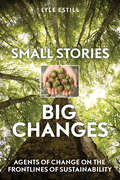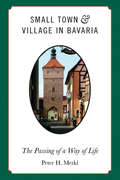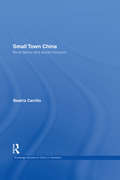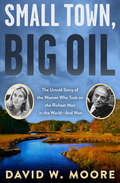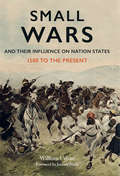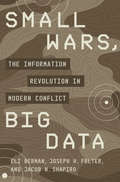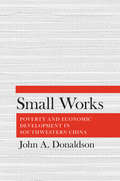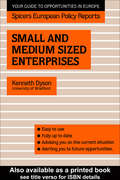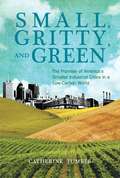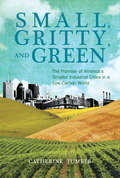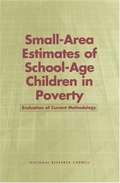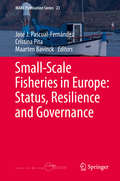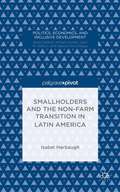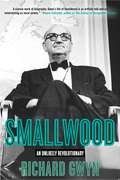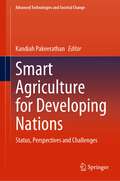- Table View
- List View
Small States in Europe: Challenges and Opportunities (Europe And The Nation State Ser.)
by Robert SteinmetzThe effects of recent institutional change within the European Union on small states have often been overlooked. This book offers an accessible, coherent and informative analysis of contemporary and future foreign policy challenges facing small states in Europe. Leading experts analyze the experiences of a number of small states including the Netherlands, the Czech Republic, Slovakia, Luxembourg, Cyprus, Iceland, Austria and Switzerland. Each account, written to a common template, explores the challenges and opportunities faced by each state as a consequence of EU integration, and how their behaviour regarding EU integration has been characterized. In particular, the contributors emphasize the importance of power politics, institutional dynamics and lessons of the past. Innovative and sophisticated, the study draws on the relational understanding of small states to emphasize the implications of institutional change at the European level for the smaller states and to explain how the foreign and European policies of small states in the region are affected by the European Union.
Small States in World Markets: Industrial Policy in Europe
by Peter J. KatzensteinBy the early 1980s the average American had a lower standard of living than the average Norwegian or Dane. Standards of living in the Netherlands, Belgium, Sweden, Switzerland, and Austria also rivaled those in the United States. How have seven small democracies achieved economic success and what can they teach America? In Small States in World Markets, Peter Katzenstein examines the successes of these economically vulnerable nations of Western Europe, showing that they have managed to stay economically competitive while at the same time preserving their political institutions. Too dependent on world trade to impose protection, and lacking the resources to transform their domestic industries, they have found a third solution. Their rapid and flexible response to market opportunity stems from what Katzenstein calls "democratic corporatism," a mixture of ideological consensus, centralized politics, and complex bargains among politicians, merest groups, and bureaucrats. Democratic corporatism is the solution these nations have developed in response to the economic crises of the 1930s and 1940s, the liberal international economy established after World War II, and the volatile markets of more recent years. Katzenstein maintains that democratic corporatism is an effective way of coping with a rapidly changing world, a more effective way than the United States and several other large industrial countries have yet managed to discover.
Small States in a Legal World
by Caroline Morris Petra ButlerThis book is a unique collection of high quality articles analysing legal issues with particular regard to small states. The small states of the world differ considerably in their geography, history, political structures, legal systems and wealth. Nevertheless, because of their size, small states face a set of common challenges including vulnerability to external economic impacts such as changing trade regimes and limited ability to diversify economic activity; limited public and private sector capacity, including the legal and judicial infrastructure; a need for regional co-operation; a vulnerability to environmental changes as well as a limited ability to engage with supranational bodies and the forces of globalisation. This is the first volume of an exciting and unique new series, The World of Small States. In this work, legal experts from small jurisdictions and those with a particular interest in legal issues facing small states explore inter alia ethics in small jurisdictions, legal education and the profession in small states, the challenges facing small states with mixed legal systems, the constitutional arrangements in small states, small states as tax havens, and intellectual property and competition law issues.
Small States in the European Union: Coping with Structural Disadvantages
by Diana PankeThe most recent EU-enlargements have considerably increased the number of small member states. In the EU-27, 19 countries have fewer votes in the Council of Ministers than the EU-average. These small states face a series of size-related disadvantages in day-to-day EU negotiations. Against this backdrop the book asks: are some small states better at coping with structural disadvantages than others? How active are small states in participating in day-to-day EU negotiations and why do some states use negotiation strategies more frequently than others? Under which conditions are the different negotiation strategies effective and when can small states punch above their weight? Based on more than 100 interviews with policy-makers and an analysis of a unique database on the negotiation activities of EU member states, this book explains how active participation is essential for the shaping success of small states and shows that small states are more influential with persuasion-based rather than bargaining-based strategies. Two case studies on the pesticides and the spirit drinks regulations further reveal that persuasion strategies are especially effective if the arguments match the nature of the issue at stake and resonate well with prior beliefs of addressees. No other study comprehensively analyzes small states in a comparative perspective, examines their activity levels in EU negotiations and outlines which conditions are needed for the effectiveness of a broad range of strategies. An indispensable resource for students and researchers interested in how and under which conditions small states can influence policies in negotiations beyond the nation-state.
Small States in the International System: Caribbean Foreign Policies toward China and Japan (Global Foreign Policy Studies)
by Kavita JohnsonThis book will explore the reorientation of the foreign policy direction of the Caribbean from traditional partners in the western hemisphere towards partners in the Asia-Pacific region. In particular, it will examine the Caribbean’s interest in increasing its engagement with China and Japan and will also investigate the opportunities and challenges for Caribbean states to deepen relations with these two countries. Opportunities include economic assistance, investments, diversification of trading partners and infrastructural development. However, with these benefits are disadvantages which relate to certain conditionalities attached to economic assistance, a widening trade deficit and on amore domestic level, challenges to regional integration which can hinder the extent and direction of these relationships. The book will also examine the main motivations behind China and Japan’s interest in the Caribbean region, premised on the argument that they are based on economic development, political security and global status. Case studies will be presented examining inter alia,the “One China Policy” in the region. As China continues to rise to power, Japan has been increasing its activities in a bid to stay relevant regionally and internationally. In examining the Caribbean’s engagement with China and Japan, a principally qualitative approach is employed by using case studies which entails the in-depth exploration of events, activities, and processes. Case studies of two Caribbean countries, Jamaica and Grenada and their engagement with China and Japan will be presented.
Small States, Russia and the West: Polarity, Constellations and Heterogeneity in the Geopolitics of the Caucasus
by Eduard AbrahamyanThis book offers an in-depth investigation of the contemporary geopolitics of the Caucasus through a multi-level analysis of regional political transformations. It delves into the contrasting foreign policies of small states in the Caucasus in response to the Russian interventions in Georgia in 2008 and Ukraine in 2014 and 2022, which marked Russia's ‘return’ as an order-forming power, challenging the agenda of Euro-Atlantic integration. The author expands and adapts Constellation Theory to examine emerging non-Western regional orders, using a relational polarity framework to argue that the choices of Armenia, Azerbaijan, and Georgia are not merely products of Russian or Western influence but are shaped by each state's unique geocultural propensities, distinct asymmetric relationships with divergent power poles, and differing perceptions of reality. This book enriches the emerging discourse on the regional complexities of the multipolar world order with multifaceted interpretations of politics and decision-making through its nuanced regional focus and innovative theoretical grounding. It contributes significantly to International Relations theory, geopolitics, small-states and area studies, offering invaluable insights into small-state foreign policy dynamics in the age of rising global multipolarity.
Small Stories, Big Changes: Agents of Change on the Frontlines of Sustainability
by David W. Orr Lyle EstillA remarkable cast of characters inhabit the pages of this book. Meet Tim Toben, who developed a high rise with the lowest energy consumption of any building in the southeastern United States, was foreclosed upon, and lost millions in the process. Gary Phillips held the line against real estate developers in Chatham County and was run out of office for his efforts. Elaine Chiosso has been protecting her watershed by fighting on behalf of the Haw River for twenty-eight years.Unflinchingly honest and compulsively readable, Small Stories, Big Changes provides an intimate look at the personal experience of being a pioneer in the sustainability movement, laying bare the emotional, spiritual, and financial impact of a life lived in the service of change. Activist, farmer, publisher, philosopher or entrepreneur; each writer has a unique personal tale to tell.Small Stories, Big Changes is a book written by ordinary people doing extraordinary things; whose lives have been transformed by their willingness to commit themselves unreservedly to the creation of a better world. Empowering, hopeful, and inspiring, this rich tapestry of voices from the vanguard of change is a must-read for anyone dreaming of a brighter future and seeking a counterbalance to a canon of work that is laced with doom and gloom.Lyle Estill is the president and co-founder of Piedmont Biofuels and the author of Industrial Evolution, Small is Possible, and Biodiesel Power. He has won numerous awards for his commitment to sustainability, outreach, community development, and leadership.
Small Town And Village In Bavaria
by Peter H. MerklAt the center of this investigation is the great modernization effort of a West German state, Bavaria, in the 1970s and 1980s, by means of a reform of the smaller units of local government. The reforms were meant to abolish all autonomous local governments serving populations of fewer than 3,000, thereby reducing the number of local governments in Bavaria from more than 7,000 to less than 2,000. Based on interviews, surveys, and statistical research, this study chronicles fifteen communities and their challenges, developments, and social changes from post-1945 up to the present. While this book explores the decline of the iconic village community, it also reveals the survival of medieval towns in a contemporary world, and despite the modern desire for comprehensive and well-integrated services, there remains a seemingly perennial appeal of small town and village life.
Small Town China: Rural Labour and Social Inclusion (Routledge Studies on China in Transition)
by Beatriz Carrillo GarciaWhile much has been written about rural migrant workers’ experiences in the big cities, population movements into China’s vast network of towns and small cities has been largely neglected. This book presents a detailed case study of rural migrant workers experiences in a small town in a north China county. The author explores the processes and institutions that enable or preclude the social inclusion of rural workers into the town’s socio-economic system. Inclusion and exclusion are assessed through an examination of rural workers’ immersion into the urban labour market, their access to welfare benefits and to social services, such as housing, education and health. The book proposes that outside the larger cities there are alternative accounts of urban social change and of the integration of rural migrant workers. It stresses the fact that the particular socio-economic structure of towns, where the state-owned share of the economy has been smaller and where consequently social and private forces have been more active, allowed for a more open inclusion of rural workers. Though shortcomings are still observed, the book suggests that China's transformation may not necessarily result in dysfunctional and socially polarized urban environments. This book will be of interest to students and scholars of China’s rural migrant workers, bottom-up urbanization and small town development, social policy, and more broadly on contemporary social change in China.
Small Town, Big Oil: The Untold Story of the Women Who Took on the Richest Man in the World—and Won
by David W. MooreHow three New Hampshire women triumphed over an oil billionaire: &“A very timely reminder that when we fight we often win.&”—Bill McKibben Never underestimate the underdog. In 1973, Greek oil shipping magnate Aristotle Onassis—husband of President John F. Kennedy&’s widow, Jacqueline, and arguably the richest man in the world—proposed to build an oil refinery on the narrow New Hampshire coast, in the town of Durham. At the time, it would have cost $600 million to build and was expected to generate 400,000 barrels of oil per day, making it the largest oil refinery in the world. The project was vigorously supported by the governor, Meldrim Thomson, and by William Loeb, the notorious publisher of the only statewide newspaper, the Manchester Union Leader. But three women vehemently opposed the project—Nancy Sandberg, the town leader who founded and headed Save Our Shores; Dudley Dudley, the freshman state rep who took the fight to the state legislature; and Phyllis Bennett, the publisher of the local newspaper that alerted the public to Onassis&’ secret acquisition of the land. Small Town, Big Oil is the story of how the residents of Durham, led by these three women, out-organized, out-witted, and out-maneuvered the governor, the media, and the Onassis cartel to hand the powerful Greek billionaire the most humiliating defeat of his business career, and spare the New Hampshire seacoast from becoming an industrial wasteland. &“Activists and organizers will find lots of ideas and inspirations in this book's detailed account of an epic battle.&”—Bill McKibben &“[An] apt handbook on the power of the people.&”—Providence Journal
Small Wars and Their Influence on Nation States: 1500 to the Present
by William UrbanAfter 1500, European warfare was repeatedly revolutionized by new weapons, new methods for supplying armies in the field, improved fortifications and new tactics for taking fortifications. This allowed empires to grow, with, for example, the Ottomans expanding into the Middle East and Africa, Britain dominating India, and Russia conquering the steppe.The dynamics of resistance to this expansion were remarkably similar to what we see today in ISIS, Afghan and Pakistani Talibans, and various jihadist groups that are more tribal than Islamist. The driving force behind these organizations may be tribal resentment of the modern world undermining long-established traditions and beliefs. Religion or their interpretation of Islam is merely a glue that holds the rebels together.Such resistance continues to be met by world powers who misunderstand the motives of the people that take up arms against them, and we should understand that ours is not the first generation to deal with this problem, and ours will probably not be the last. However, there are some methods that work better than others. The failures and successes of the past can help us now and in the future.
Small Wars, Big Data: The Information Revolution in Modern Conflict
by Eli Berman Joseph H. Felter Jacob Shapiro Vestal McIntyreHow a new understanding of warfare can help the military fight today’s conflicts more effectivelyThe way wars are fought has changed starkly over the past sixty years. International military campaigns used to play out between large armies at central fronts. Today's conflicts find major powers facing rebel insurgencies that deploy elusive methods, from improvised explosives to terrorist attacks. Small Wars, Big Data presents a transformative understanding of these contemporary confrontations and how they should be fought. The authors show that a revolution in the study of conflict--enabled by vast data, rich qualitative evidence, and modern methods—yields new insights into terrorism, civil wars, and foreign interventions. Modern warfare is not about struggles over territory but over people; civilians—and the information they might choose to provide—can turn the tide at critical junctures.The authors draw practical lessons from the past two decades of conflict in locations ranging from Latin America and the Middle East to Central and Southeast Asia. Building an information-centric understanding of insurgencies, the authors examine the relationships between rebels, the government, and civilians. This approach serves as a springboard for exploring other aspects of modern conflict, including the suppression of rebel activity, the role of mobile communications networks, the links between aid and violence, and why conventional military methods might provide short-term success but undermine lasting peace. Ultimately the authors show how the stronger side can almost always win the villages, but why that does not guarantee winning the war. Small Wars, Big Data provides groundbreaking perspectives for how small wars can be better strategized and favorably won to the benefit of the local population.
Small Works: Poverty and Economic Development in Southwestern China
by John A. DonaldsonHow can policymakers effectively reduce poverty? Most mainstream economists advocate promoting economic growth, on the grounds that it generally reduces poverty while bringing other economic benefits. However, this dominant hypothesis offers few alternatives for economies that are unable to grow, or in places where economic growth fails to reduce or actually exacerbates poverty. In Small Works, John A. Donaldson draws on his extensive fieldwork in two Chinese provinces—Yunnan and Guizhou—that are exceptions to the purported relationship between economic growth and poverty reduction. In Yunnan, an outward-oriented developmental state, one that focuses on large-scale, urban development, has largely failed to reduce poverty, even though it succeeded in stimulating economic growth. Provincial policy shaped roads, tourism, and mining in ways that often precluded participation by poor people. By contrast, Guizhou is a micro-oriented state, one that promotes small-scale, low-skill economic opportunities—and so reduces poverty despite slow economic growth. It is no coincidence that this Guizhou approach parallels the ideas encapsulated in the "scientific development view" of China's current president Hu Jintao. After all, Hu, when Guizhou's leader, helped establish the micro-oriented state in the province. Donaldson’s conclusions have implications for our understanding of development and poverty reduction, economic change in China, and the thinking behind China's policy decisions.
Small and Medium Sized Enterprises
by Kenneth DysonThe single European market after 1992 presents a major challenge to small and medium-sized companies in the Community. Whether it is developing exports and/or fighting off new imports, Europe's entrepreneurs will have to `think European'. Moreover, the European Community institutions themselves have developed special policies designed to promote the interests of Europe's smaller companies. This volume explains how the EC's policies towards small and medium-sized enterprises have developed and what they currently entail. It guides the reader through the various EC policy initiatives and the new legislation - including that in the `1992' package - relevant to the smaller business company. It offers summaries of the key EC documents concerned, and presents a full listing of all the other relevant proposals and policies. Like the others in this series, the volume is both comprehensive and up-to-date: it discusses not only what the EC has done which is relevant to small businesses, but also what it is proposing to do in the future.
Small is Democratic: An Examination of State Size and Democratic Development
by Dana OttFirst published in 2001. Routledge is an imprint of Taylor & Francis, an informa company.
Small is Still Beautiful: Economics as if Families Mattered
by Joseph PearceA third of a century ago, E. F. Schumacher rang out a timely warning against the idolatry of giantism with his book Small Is Beautiful. Schumacher, a highly respected economist and adviser to third-world governments, broke ranks with the accepted wisdom of his peers to warn of impending calamity if rampant consumerism, technological dynamism, and economic expansionism were not checked by human and environmental considerations. Joseph Pearce revisits Schumacher&’s arguments and examines the multifarious ways in which Schumacher&’s ideas themselves still matter. Faced though we are with fearful new technological possibilities and the continued centralization of power in large governmental and economic structures, there is still the possibility of pursuing a saner and more sustainable vision for humanity. Bigger is not always best, Pearce reminds us, and small is still beautiful. Humanity was lurching blindly in the wrong direction, argued Schumacher. Its obsessive pursuit of wealth would not, as so many believed, ultimately lead to utopia but more probably to catastrophe. Schumacher's greatest achievement was the fusion of ancient wisdom and modern economics in a language that encapsulated contemporary doubts and fears about the industrialized world. The wisdom of the ages, the perennial truths that have guided humanity throughout its history, serves as a constant reminder to each new generation of the limits to human ambition. But if this wisdom is a warning, it is also a battle cry. Schumacher saw that we needed to relearn the beauty of smallness, of human-scale technology and environments.
Small, Gritty, and Green
by Catherine TumberAmerica's once-vibrant small-to-midsize cities--Syracuse, Worcester, Akron, Flint, Rockford, and others--increasingly resemble urban wastelands. Gutted by deindustrialization, outsourcing, and middle-class flight, disproportionately devastated by metro freeway systems that laid waste to the urban fabric and displaced the working poor, and struggling with pockets of poverty reminiscent of postcolonial squalor, small industrial cities--as a class--have become invisible to a public distracted by the Wall Street (big city) versus Main Street (small town) matchup. These cities would seem to be part of America's past, not its future. And yet, journalist and historian Catherine Tumber argues in this provocative book, America's gritty Rust Belt cities could play a central role in a greener, low-carbon, relocalized future. As we wean ourselves from fossil fuels and realize the environmental costs of suburban sprawl, we will see that small cities offer many assets for sustainable living not shared by their big city or small town counterparts: population density (and the capacity for more); fertile, nearby farmland available for local agriculture, windmills, and solar farms; and manufacturing infrastructure and workforce skill that can be repurposed for the production of renewable technology. Tumber, who has spent much of her life in Rust Belt cities, traveled to twenty-five cities in the Northeast and Midwest--from Buffalo to Peoria to Detroit to Rochester--interviewing planners, city officials, and activists, and weaving their stories into this exploration of small-scale urbanism. Smaller cities can be a critical part of a sustainable future and a productive green economy. Small, Gritty, and Green will help us develop the moral and political imagination we need to realize this.
Small, Gritty, and Green: The Promise of America's Smaller Industrial Cities in a Low-Carbon World (Urban and Industrial Environments)
by Catherine TumberHow small-to-midsize Rust Belt cities can play a crucial role in a low-carbon, sustainable, and relocalized future.America's once-vibrant small-to-midsize cities—Syracuse, Worcester, Akron, Flint, Rockford, and others—increasingly resemble urban wastelands. Gutted by deindustrialization, outsourcing, and middle-class flight, disproportionately devastated by metro freeway systems that laid waste to the urban fabric and displaced the working poor, small industrial cities seem to be part of America's past, not its future. And yet, Catherine Tumber argues in this provocative book, America's gritty Rust Belt cities could play a central role in a greener, low-carbon, relocalized future.As we wean ourselves from fossil fuels and realize the environmental costs of suburban sprawl, we will see that small cities offer many assets for sustainable living not shared by their big city or small town counterparts, including population density and nearby, fertile farmland available for new environmentally friendly uses.Tumber traveled to twenty-five cities in the Northeast and Midwest—from Buffalo to Peoria to Detroit to Rochester—interviewing planners, city officials, and activists, and weaving their stories into this exploration of small-scale urbanism. Smaller cities can be a critical part of a sustainable future and a productive green economy. Small, Gritty, and Green will help us develop the moral and political imagination we need to realize this.
Small-Area Estimates of School-Age Children in Poverty: Evaluation of Current Methodology
by National Research CouncilA report on Small-Area Estimates of School-Age Children in Poverty
Small-Scale Fisheries in Europe: Status, Resilience and Governance (MARE Publication Series #23)
by Maarten Bavinck José J. Pascual-Fernández Cristina PitaThis book offers a comprehensive account of the status and dynamics of people participating in the small-scale fisheries (SSF) of Europe. It covers the situation of SSF in 25 coastal countries, thereby providing a portrait of almost every coastal country on the continent and analyzing the recent evolution of the sector. Small-scale fisheries are argued to be extremely important in Europe, as they provide employment and welfare, while increasing food sovereignty and maintaining communities in coastal areas. The recent worldwide focus on SSF derives from their environmental sustainability, which distinguishes many of their activities from those of large-scale fisheries. This book analyses the diversity of SSF and shows how fishing communities have sometimes developed successful governing models, demonstrating social and economic resilience. While the book emphasizes the strengths of SSF and the synergies that occur with other marine sectors, it also presents cases of failure, in which collective action and policy have actually contributed to a weakening of the sector. In this context, the book shows how governmental policies toward SSF vary considerably from country to country, in a way that is not entirely consistent with European policies.
Small-Town Russia: Postcommunist Livelihoods and Identities: A Portrait of the Intelligentsia in Achit, Bednodemyanovsk and Zubtsov, 1999-2000 (BASEES/Routledge Series on Russian and East European Studies #Vol. 12)
by Anne WhiteThis book examines a number of key questions about social change in contemporary Russia - issues such as how people survive when they are not paid for months on end, 'the New Poor', the falling birth rate, why so many Russian men die in middle age, whether regional identities are becoming stronger, and how people's sense of 'Russianness' has developed since the creation of the Russian Federation in 1992. It examines these issues by looking at actual experiences in three small Russian towns. It includes a great deal of original ethnographic research, and, by looking at real places overall, provides a good sense of how different aspects of social change are interlinked, and how they actually affect real people's lives.
Smallholders And The Non-farm Transition In Latin America
by Isabel HarbaughSmallholders and the Non-Farm Transition in Latin America explores the drivers of agricultural displacement in Latin America and concludes that government and non-profit support is essential to help small farmers transition to a profitable alternative in the non-farm sector. Due to such factors as limits in arable land, globalization, increased mechanization, and rising land consolidation, agricultural displacement is occurring rapidly and has led to an increase in urbanization and non-farm diversification. This book reviews existing literature and case studies on the non-farm transition as well as public and private initiatives that have provided much needed support. By helping small farmers build non-farm skills and knowledge, facilitating profitable land transactions, and fostering a business environment that supports rural job creation, governments can ensure that small farmers are not only able to transition to non-farm employment, but that they are able to do so in a way that maximizes rural welfare.
Smallwood
by Richard GwynThe extraordinary life of Joey Smallwood is the stuff of fiction-literally: Wayne Johnston's acclaimed novel, The Colony of Unrequited Dreams, draws heavily on this definitive biography. And no wonder! Set against a colorful background in stirring times it has, as its hero, a character whose career defied both convention and the odds. A one time pig farmer and ardent socialist-turned-union-buster Smallwood is best remembered as the man responsible for bringing Newfoundland into confederation with Canada.A full ten years before Alaska and Hawaii became the 49th and 50th states of the union a massive British Dominion on the Eastern Seaboard was at a crossroads. Should they join the US as its 49th state? Maintain ties with the British via a British-led commission of government? Should they join Canada? Joey Smallwood, a well-known radio personality, writer and organizer at the time, led a spirited campaign in favor of joining Canada. With 52.3% of a controversial vote marred by sectarian tensions Newfoundlanders voted with Smallwood and the boundaries of Canada as we know them today were established. The first premier of Newfoundland, Smallwood ran Newfoundland virtually unchallenged for 23 years.Smallwood's work experience was checkered, at best, but included stints as a contributor to socialist newspapers in New York and London. He was self-taught, and possessed the enthusiasm and wrong-headedness of the autodidact. As Gwyn shows, however, Smallwood possessed ambition of a rare order and utterly unconquerable self-confidence.These qualities combined with unerring political instinct enabled Smallwood to drag a reluctant Newfoundland into union with Canada, and subsequently to impose his will over compliant colleagues and a vestigial opposition until he governed his island province with the near-absolute power of a despot. Like a despot, too, he countenanced corruption on a scale rarely equaled in Canada. His fall, no less than his rise to power, contains elements of pathos, farce, and pure, farfetched wonderfulness.Richard Gwyn interviewed Smallwood extensively and enjoyed his subject's full co-operation. But this is in no sense an authorized biography. It is a balanced, informed, and deeply considered life of a unique political figure.
Smallwood: An Unlikely Revolutionary
by Richard Gwyn“A masterpiece of political reporting” and an inspiring, astonishing biography of Joey Smallwood, a man who changed the face of Canada forever (Saturday Night). In 1949, ten years before Alaska and Hawaii joined the United States, the dominion of Newfoundland was at a crossroads. Should they join as America’s 49th state, maintain ties with Great Britain, or join Canada? Joey Smallwood, a well-known radio personality, writer and organizer, led a spirited campaign in favor of joining Canada. In a controversial vote, Newfoundlanders went with Smallwood, and the boundaries of Canada as we know them today were established. The first premier of Newfoundland, Smallwood continued in that position virtually unchallenged for twenty-three years. A one-time pig farmer and ardent socialist-turned-union-buster, Smallwood’s political experience was checkered at best. But with insatiable ambition and unerring political instincts, he successfully imposed his will over compliant colleagues and weak opposition. Governing his island province with nearly despotic power and fostering corruption on a grand scale, Smallwood’s eventual fall from grace was an epic event in Canadian politics. Taken from interviews with Smallwood himself, and with his subject’s approval, Richard Gwyn has crafted “a classic work of biography . . . as artfully told and as entertaining as most novels” (Wayne Johnston, author of The Colony of Unrequited Dreams).
Smart Agriculture for Developing Nations: Status, Perspectives and Challenges (Advanced Technologies and Societal Change)
by Kandiah PakeerathanThis book in its eighteen chapters provides sustainable and smart technology-based solutions to developing nations. Smart farming is growing in importance due to the increasing demand for higher crop yield, the need for using natural resources efficiently, the rising use and sophistication of information and communication technology and the increasing need for climate-smart agriculture. Some of these chapters deal with the applications of smart agriculture to address the special challenges of the Small Island Developing States for sustainable agriculture. The book brings together scientific communities from India, Indonesia, Iraq, Malaysia, Mauritius, Myanmar, Palestine, Sri Lanka and South Africa to share their expertise to make the farming system more connected and intelligent. The smart farming techniques shared in different chapters not only help to reduce the overall cost and improve the quality and quantity of products but altogether help improve the sustainability of agriculture in the developing world.‘Smart Farming’ is a management concept focused on providing the agricultural industry with the infrastructure to leverage advanced technologies—including artificial intelligence (AI), big data, robotics, drones and Internet of Things (IoT)—for tracking, monitoring, automating and analyzing operations. Sometimes known as precision agriculture, smart farming is software managed and sensor monitored.
